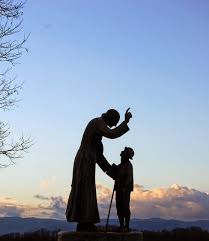The entire Bible can be summed up in three stories: Adam, Abraham, and Peter. In the first story, Adam and Eve leave paradise, deciding to live life on their own terms. We have been wandering, lost and confused, ever since. In the second story Abraham, correcting Adam’s faithlessness, follows the God’s direction. As we hear in the first reading today, Yahweh tells him to “go from the land of your father’s house, to a land that I will show you.” In the third story, in today’s Gospel, Jesus takes Peter, James, and John up a high mountain to enter into the land of eternal life, peace, and joy. “Lord, it is good for us to be here,” Peter says. “Let us build three tents.” Let us live here, in your presence, forever. That’s the bible, and the Christian life, in three stories: Adam leaves God’s garden on earth; Abraham follows God back to the Holy Land; and Peter enters God’s dwelling in heaven. The Garden of Eden, the first earthly paradise, was not enough for us. Jerusalem, the second earthly City of God, also fails us. It is only in the Transfiguration, when Peter and the others enter heaven, that mankind glimpses of our true and lasting home.
Transfiguration
God promised Abraham’s a land “flowing with milk and honey,” which is the biblical way of saying all the good things of this life—a good job, loyal friends, your own house, sound investments, a car that starts when you turn the key, children who bring honor to your old age, etc. But these things will never fully satisfy us. They are only signposts on a journey which ends in heaven. We’ve always had trouble keeping our focus on our final end, but over the last 20 years or so, we’ve become especially disoriented. Since the “digital revolution,” people raised with unlimited entertainment, social media, pornography, and 24-hour newsfeeds have more trouble focusing on their essential purpose and final end. Constant noise and distraction, made possible by recent technologies, confuse us as never before.
The Lord’s Transfiguration focused the disciples on the one thing necessary: staying close to God, both in this life and in the life of the world to come. Pope Leo the Great explained the Transfiguration in a homily from around the year 450: “The great reason for this transfiguration was to remove the scandal of the Cross from the hearts of his disciples …they were to look forward to a share in that glory which first blazed out in Christ their head.” The absurdity of the Crucifixion is the archetypical distraction. The absurdities and brutalities of life can easily derail our faith in God and the rational order. But don’t let yourself be distracted when friends and family and your career fail you. Everything this side of the grave will fail you at some point, but you were never meant to stay here anyway. We are pilgrims, on our way to a land that God will show us. “Go,” Yahweh told Abram, “to a land that I will show you. And Abram went as the Lord directed him.”
Dominus Pars
I just finished the little book on the priesthood co-authored by Pope Benedict and Cardinal Robert Sarah, From the Depths of Our Hearts. Some bishops, especially in Germany and other very wealthy countries, are petitioning the Pope to end priestly celibacy. Celibacy is hard for priests, just like fidelity to one woman is hard for married men. But when a priest chooses to live for God alone, sacrificing his natural right to a wife and children, he refocuses all of us on our final end, which is eternal life with God in heaven. “The true foundation for celibacy,” writes Pope Benedict in the book, “can be contained in the phrase: Dominus pars. You are my land.” With Abraham, the Catholic priest leaves the comfort and security of his home; he journeys blindly to a land God will show him. He gives up wife and children, his “land.” His “portion” and his “inheritance” is God alone. “The priest,” Cardinal Sarah writes, “can and must have nothing but God.” Not many priests in affluent countries like ours live this calling well. But make no mistake: this is the vocation of every Catholic priest: to point the way to heaven by their poverty. The fundamental problem with the priesthood today is not sex. It’s money: priests whose incomes far exceed their needs. Priests in poor countries, or priests who live simple lives of service, generally do not commit sexual crimes. A priest’s purity of heart refocuses every heart on the life of the world to come; a priests impurity sends souls to hell. Let us pray for our priests to be men of God, to wholeheartedly give what God asks, and to point us all to heaven. “You have shown me the way to Ars,” St. John Vianney told a boy who had pointed the way to his new parish. “I will show you the way to heaven.”



 RSS Feed
RSS Feed